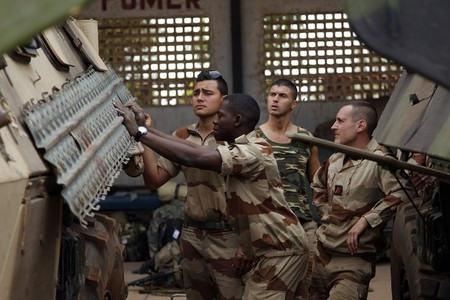The war in Mali makes the case for non-interventionism.

There's been a lot of nonsense talk of late about a potential American "retreat" from the world -- a return to the dreaded "isolationism" of the 1930s. In reality, most of those making the case for a more restrained foreign policy don't want a worldwide "retreat" but simply less meddling in countries whose dynamics the West doesn't understand and can't direct.
Fortunately (or rather, unfortunately) the Western war in Mali is serving as Exhibit A for the non-interventionist case. First, the New York Times' Adam Nossiter explains how the Mali rebellion benefited from the fall of the Gaddafi regime in Libya:
Well, when Gadhafi fell, his extensive arsenals in the south of Libya were left totally unguarded, unprotected by the Western forces that brought him down. Gadhafi had fighting for him a number of ethnic nomad fighters from Mali, the Tuaregs. And so when Gadhafi fell, these Tuaregs returned to Mali, where their group had been conducting a rebellion for almost 60 years against the Malian state.They took with them a lot of the weapons that were in Gadhafi's arsenal. So for the first time in their long history of rebellion against Mali, they were properly armed and equipped thanks to Moammar Gadhafi. And it was those weapons that allowed these nomadic rebels to crush the Malian army in January, February and March of 2012.
Al-Qaida was already installed in the desert and they made a sort of tactical alliance with these nomadic rebels. But the al-Qaida forces, being tougher, took the upper hand, and so now they're the ones in control.
Now, the rebellion in Mali had raged long before the Western intervention in Libya and even without Western help, the forces battling Gaddafi may have prevailed -- or may have provoked enough disorder and lawlessness that these weapons could have slipped from Libya into Mali. Still, the Western intervention clearly accelerated the disintegration of the Gaddafi regime and poured jet-fuel on the fires simmering in Mali. And that has now led to... another intervention.
And it gets worse:
But as insurgents swept through the desert last year, commanders of this nationâ??s elite army units, the fruit of years of careful American training, defected when they were needed most â?? taking troops, guns, trucks and their newfound skills to the enemy in the heat of battle, according to senior Malian military officials.â??It was a disaster,â? said one of several senior Malian officers to confirm the defections.
Then an American-trained officer overthrew Maliâ??s elected government, setting the stage for more than half of the country to fall into the hands of Islamic extremists. American spy planes and surveillance drones have tried to make sense of the mess, but American officials and their allies are still scrambling even to get a detailed picture of who they are up against. [Emphasis added.]
It bears repeating that Mali's rebels would be fighting with or without American interference and the rebellion against Gaddafi may have resulted in the eventual collapse of his regime and a southern flood of weapons. But what is unmistakably clear is that American (and Western) efforts have not only failed to improve things, they've likely made the situation considerably worse. Will Congress question the Obama administration over this?
(AP Photo)



